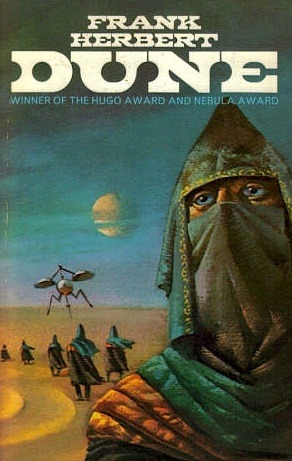 Dune is a 1965 epic science fiction novel by Frank Herbert. It won the Hugo Award in 1966, and the inaugural Nebula Award for Best Novel. Dune is the world's best-selling science fiction novel and is the start of the Dune saga says wiki. And that all seems fair enough. Read more there.
Dune is a 1965 epic science fiction novel by Frank Herbert. It won the Hugo Award in 1966, and the inaugural Nebula Award for Best Novel. Dune is the world's best-selling science fiction novel and is the start of the Dune saga says wiki. And that all seems fair enough. Read more there.The cover I'm showing you here is the one I remember from my youth, not the one I've just read. Its notable for the rather implausible "ornithopter" but really, what was the artist to make of Frank Herbert's concept?
As to the book, I remember it making a great impression on me when young. Re-reading it now (I don't think I've re-read it since) its fairly clear that it strives for impressiveness, which weakens it from an adult perspective (minor example-of-a-type: often, people say "like wow, he just did that", to convince us-the-reader that the thing just done was like mega-impressive). Various aspects of the "economics" (the CHOAM stuff, say) which seemed rather well crafted to my youthful self now look crude. His interest in ecology fares much better - the sum total doesn't quite work, but much of the detail is believable, and the aura of it well done. and the story overall is good, if you gloss over the defects.
Don't miss my review of the film(s) or Children of Dune. See-also CIP's review.
2025: I've re-read the second half, just because I wanted some lightweight bedtime reading. And it works well for that. The second half is tighter paced and with less of the introspection of the first half; it is an exciting read. I maintain my assertion that the emperor actually landing on Arrakis is obviously dumb; and Paul winning by threatening to destroy all the spice doesn't make sense - yes it would be bad for the Guild (but they have vast stockpiles), but it would also be bad for him; Arrakis would become an uninteresting dessert planet of no importance. Putting that aside, what strikes me more - in the wake of the terrible October 7 Hamas-led attack on Israel - is the emphasis on the Fremen bloodthirstiness; their holding hard to old grudges; and their tribal nature. Because in the book this is all directed against Bad People its OK; but the way it rings true doesn't augur well for the read world (taking as given the obvious the-Fremen-are-Arabs). As we see only too well. Paul nominally fights against the Jihad he can see coming but actually doesn't; nad the book itself makes no argument against the closed tribal society, indeed it celebrates it.